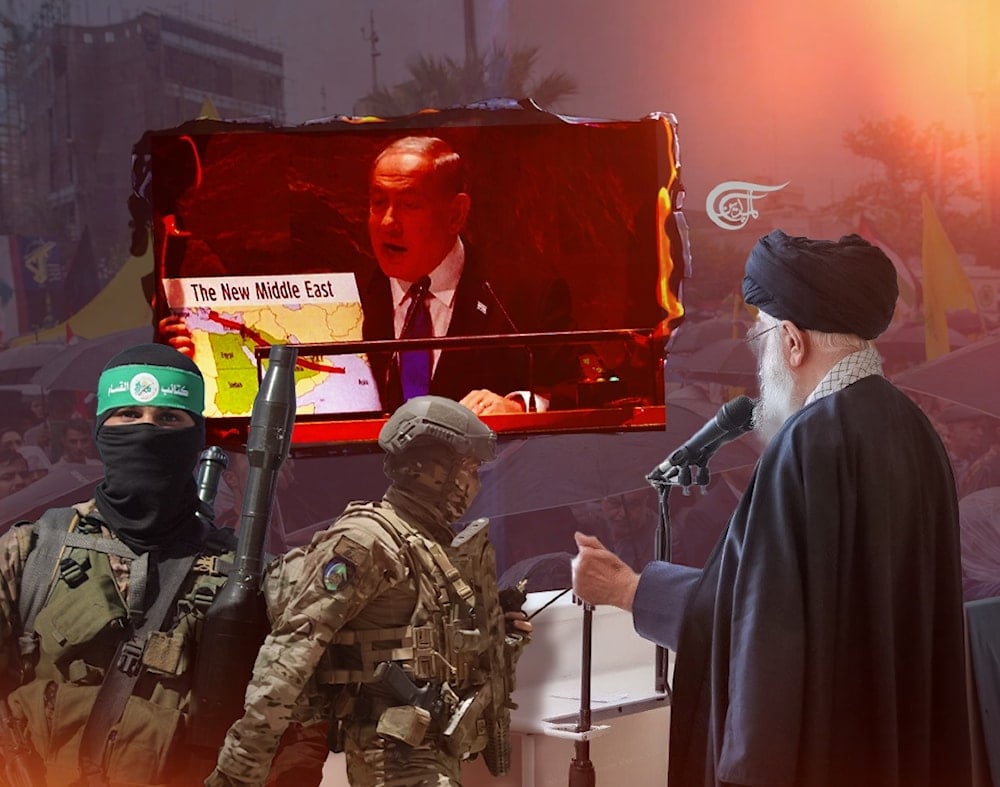Resilience and flexible strategies during the Al-Aqsa Flood
The unity of the fronts requires not just institutionalization but also coordinated action. The Resistance must mirror its enemy’s standard of offensiveness to maintain the upper hand in this enduring struggle.
-

To strengthen the Resistance moving forward, the guidance of Sayyed Khamenei must be heeded. (Al Mayadeen English; Illustrated by Ali al-Hadi Shmeiss)
Iran is a nation built on institutions rooted in the people. Its constitution defines it as an Islamic Republic, emphasizing principles such as maintaining an open hand policy towards the oppressed. These revolutionary ideals remain foundational, regardless of who holds power. However, translating these ideals into actionable strategy often relies on the vision and execution of individuals on the ground due to a lack of unified, predefined strategy.
This reliance on leadership underscores Iran's flexibility. The effectiveness of its political, military, and security strategies is influenced by the strength and resolve of its leaders. For instance, when Saeed Jalili was Chief Nuclear Negotiator of Iran, his assertive leadership advanced uranium enrichment from 5% - a threshold the previous administration had sought Western approval - to 20%, bypassing negotiation and addressing the West with firm rhetoric. Weaker personalities lack the resolve needed to advance such critical projects, such as Iran's domestic nuclear program.
General Qassem Soleimani exemplified leadership with a clear vision and mission. Soleimani transformed the Quds Force, advancing the Resistance Axis and elevating the regional struggle to a new phase. While Iran’s core policy remains supporting the oppressed, it was Soleimani's practical leadership that turned this commitment into actionable reality.
The trap of diplomacy can be on the level of hesitating to confront the occupation entity due to fear of escalating war, even whilst suffering strikes and assassinations. "Israel", with its strategy of maximal aggression, aims to eliminate every resistance front. In such a scenario, mismatched standards between the Resistance and its enemy favour the latter.
To succeed, the Resistance must respond in a language the enemy understands. For example, when Lebanon launched 50 operations a day against "Israel", the intensity compelled Netanyahu to seek a ceasefire within two days.
Iran, as the heart of the Resistance Axis, cannot be blamed for any setbacks across various resistance fronts when internally, it faces similar challenges, including the lack of a unified strategy to address large-scale confrontations.
The unity of fronts became institutionalized after Soleimani, who was the link between all the fronts. The Al-Aqsa Flood battle marked the first practical implementation of this unity, but the absence of pre-coordination prevented a full-scale strategic war with simultaneous action across all fronts.
"Israel" seeks to achieve its goal through spreading fear and aggression, viewing its survival as based on eliminating the Resistance. For the unity of fronts to succeed against such an enemy, decisive and coordinated strikes are essential. The West during the initial months of war took the idea of the Resistance Axis "unity of the fronts" more seriously, than the resistance axis held itself to.
When "Israel" saw there was no strong response after assassinating Haniyah and Shokr, this encouraged them to enter Lebanon and kill its top leader. Consequently, Resistance goals focused on survival rather than decisively overcoming the enemy at the right opportunity, which could lead to turning points in the struggle.
Delayed responses only increase challenges and embolden the enemy.
The late Secretary General of Lebanon’s Islamic Resistance demonstrated the effectiveness of initiative, striking fear in "Israel". However, defensive strategies—focused on preserving individual fronts or quickly ending wars on those fronts—ultimately work to "Israel’s" advantage. On the other hand, Ansar Allah’s offensive approach has provided them with greater protection and success. Understanding the reality of the situation removes any surprise from unfolding events.
To strengthen the Resistance moving forward, the guidance of Sayyed Khamenei must be heeded. Foreign policy strategies need to be clearly defined, ensuring that any leadership, regardless of personality or politics, adheres to established principles. The unity of the fronts requires not just institutionalization but also coordinated action. The Resistance must mirror its enemy’s standard of offensiveness to maintain the upper hand in this enduring struggle.

 Batool Subeiti
Batool Subeiti
 4 Min Read
4 Min Read









